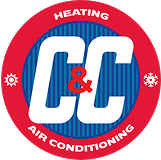Fixing tightly sealed doors and windows and insulating solid walls and floors can help to prevent temperature loss in your home. However, removing these same air gaps can also reduce your home’s ability to get rid of old, stale air and replace it with fresh outdoor air. Because of this, many HVAC companies recommend adding ventilation systems to your home to keep airflow moving in a positive way.
Mechanical ventilation systems enable the control of impurities and pollutants, control air regulation, reduce damp conditions, and draw excess temperature. This article will discuss the working principle of HRV/ERV systems, how to choose one, and routine maintenance practices.
Working Principle of HRV/ERV Systems
The main difference between HRVs and ERVs is that HRVs recover only heat from the air while ERVs regulate heat and moisture in the air.
HRVs (heat recovery ventilators) replace stale air in your house with fresh and clean outdoor air. This device utilizes the heat in external air to pre-heat the air entering your room, thus minimizing all heating and cooling costs. The concept of pre-heating or pre-cooling air using exhaust air explains why they’re also called air-to-air heat exchangers.
During summer or hot seasons, the HRV takes heat from the expelled, stale air and uses it to heat the incoming clean and fresh air. Afterward, the clean air is evenly distributed throughout your house. This process takes a different route during cold seasons. During winter, the HRV removes excessive heat from the incoming fresh air and transfers it to outgoing air.
ERVs (Energy Recovery Ventilators) are special HRVs that exchange heat and moisture. Using the ERV gives you better control over the dampness levels in your house during humid climates. The ERV system transfers excess air moisture from incoming air to the exhaust air. The AC unit is left with the easy task of cooling dry air than moist air. This can reduce the cost of your utility bills.
Winter may take a different turn and have dry air. The ERV system recovers part of the moisture exhausted from the HRV core to achieve comfortable humidity levels. Extreme air dryness causes discomfort, sore throats, and static electricity. Always control the HRV to avoid drying off every last drop of moisture in your room.
Choosing HRV/ERV Systems
Humidity level heavily impacts the type of ventilation system to use. Other than humid air, we’ve listed other factors that predominantly affect the use of your HVAC system at home. Here are a few factors to help you choose between the HRV and the ERV systems
Prevailing Climate Conditions
Always go for an HRV system if your current location experiences seasonally high humidity. However, for places with dry winters, the ERV is a sufficient option.
Size of Family
A family with more members living in a small home creates more humidity than one with few people. This happens through talking, bathing, and cooking. If you find that your home gets moist when everyone is taking morning showers, for example, an HRV makes a lot of sense.
Health and Personal Reasons
Always consider the health conditions and personal needs of members of your family. Some of your family members, or even you, could be suffering from allergies, asthma, or breathing difficulties due to arid air. Consider an ERV system if you have a health condition that worsens once the air in your house gets too dry.
Room Size
HRVs are better options for small or medium-sized houses, where humidity accumulates quickly. However, you may wish to go for ERVs if you live in larger homes and in a climate with less moisture in the air.
Tightly Sealed Homes
Most houses built before 1977 allowed free circulation of air. However, modern homes today are air-tight, which causes the accumulation of more moisture in the rooms. HRVs serve better in air-tight houses compared to ERVs.
Best HRV/ERV Systems Maintenance
The HRV and ERV ventilation systems are designed to be pretty low maintenance, but it’s good to check on them once in a while. Scheduled maintenance practices increase the longevity and reliability of your ventilator.
Always Clean or Replace Air Filters.
Dirty air filters may cause unbalanced airflow, reduced ventilation efficiency, or constant shut down of your system (for systems with an airflow switch). Always vacuum or clean the interior surfaces next to the filters. We recommend cleaning at least once every three months. Lastly, replace non-washable filters periodically for increased ventilation efficiency.
Clear Obstructions on the Exterior Intake and Exhaust Vents
It’s common for the screen openings of the outside vents to be blocked by debris, such as grass. Remove any debris to allow airflow. Also, check if the exhaust hood with a back-draft damper is correctly positioned for air to freely flow in and out of the system. Move the vent opening higher up the wall once you notice regular clogging on the exterior and exhaust.
Check the Condensate Drain and Tubing
If your old HRV/ERV system is having problems, cleaning the condensate drain and pan might be all it needs to get back to running smoothly. The easiest way to clean the condensate drain and pan on your HRV/ERV system is to run a sink faucet into a bucket while pointing the condensate drain down into the bucket.
Always Service the Fans
When you get a professional to service the fans, they will unplug the unit and remove the cover. They take out the filters, then take out the fan assembly and remove the dust from each fan blade.
Inspect & Clean the Duct Grilles
To inspect the ductwork, use a flashlight to check for buildup. While some will suggest that you use an air compressor or vacuum cleaner to remove it, there can be a lot more buildup deeper in the system that is only accessible by a professional.
Plan for Annual Servicing
One of the best ways to ensure your family’s home air quality is optimal is to regularly maintain your HRV, ERV, or heat exchanger system. Servicing may include replacing the filters every year, which you can do. If you find this too daunting, consider getting a professional to do it for you. Annual maintenance plans are more than filter changes, though. A professional will look at all of the accessible portions of your ventilation system and will make sure that they are working correctly and efficiently.
Wrapping Up
Installing an HRV/ERV system offers numerous benefits to your health and wellbeing. C & C Heating and Air Conditioning offers a wide range of heating and air conditioning services for residents of Roseville, MI and throughout the Detroit Metro Area. They include installations, step-by-step diagnosis, and maintenance.
Our mission is to ensure that you’ll never worry about extreme temperatures in your home. We offer 24/7 emergency service, so reach us at any time of the day and book your slot. Contact C & C Heating and Air Conditioning today, and let us take care of your HVAC systems!





